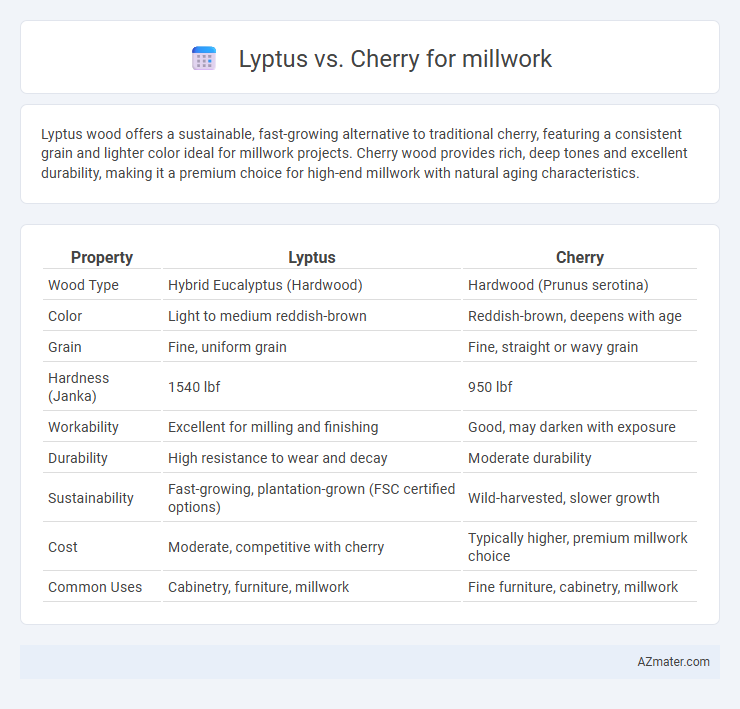Lyptus wood offers a sustainable, fast-growing alternative to traditional cherry, featuring a consistent grain and lighter color ideal for millwork projects. Cherry wood provides rich, deep tones and excellent durability, making it a premium choice for high-end millwork with natural aging characteristics.
Table of Comparison
| Property | Lyptus | Cherry |
|---|---|---|
| Wood Type | Hybrid Eucalyptus (Hardwood) | Hardwood (Prunus serotina) |
| Color | Light to medium reddish-brown | Reddish-brown, deepens with age |
| Grain | Fine, uniform grain | Fine, straight or wavy grain |
| Hardness (Janka) | 1540 lbf | 950 lbf |
| Workability | Excellent for milling and finishing | Good, may darken with exposure |
| Durability | High resistance to wear and decay | Moderate durability |
| Sustainability | Fast-growing, plantation-grown (FSC certified options) | Wild-harvested, slower growth |
| Cost | Moderate, competitive with cherry | Typically higher, premium millwork choice |
| Common Uses | Cabinetry, furniture, millwork | Fine furniture, cabinetry, millwork |
Introduction to Lyptus and Cherry Wood
Lyptus is a fast-growing hybrid eucalyptus known for its hardness and uniform grain, making it a sustainable alternative for millwork applications. Cherry wood, derived primarily from American Black Cherry trees, offers rich color, smooth texture, and excellent workability prized in fine woodworking. Both woods are favored in millwork, with Lyptus providing greater environmental benefits and Cherry delivering classic beauty and warmth.
Origins and Sourcing of Lyptus and Cherry
Lyptus wood is sourced from fast-growing Eucalyptus urophylla and Eucalyptus grandis hybrids cultivated in sustainably managed plantations primarily in Brazil, ensuring a renewable and eco-friendly supply chain. Cherry, specifically American Black Cherry (Prunus serotina), is native to North America and harvested from natural forests, often involving slower growth rates and selective logging practices. The plantation-based origin of Lyptus enables consistent quality and availability, while Cherry's natural forest provenance offers unique grain patterns influenced by older growth maturity.
Grain Pattern and Visual Appeal
Lyptus offers a consistent, fine grain pattern with a smooth texture, making it ideal for modern millwork designs seeking a clean, uniform appearance. Cherry wood features a rich, warm color with a distinctive, swirling grain that adds character and depth, enhancing traditional millwork aesthetics. While Lyptus provides a more uniform visual appeal, Cherry's varied grain patterns deliver a natural, elegant charm preferred for classic and high-end millwork projects.
Durability and Hardness Comparison
Lyptus wood offers exceptional durability with a hardness rating of 1,820 on the Janka scale, making it highly resistant to wear and dents in millwork applications. Cherry wood, with a Janka hardness of approximately 995, is softer and more susceptible to dings and scratches but provides a warm, rich finish attractive for fine detailing. Choosing Lyptus over Cherry enhances longevity and structural integrity in millwork projects where durability and hardness are critical.
Workability and Finishing Qualities
Lyptus offers excellent workability due to its uniform grain and consistent density, making it easy to machine, shape, and sand for millwork projects. Cherry wood, prized for its fine, smooth texture and natural reddish-brown color, provides superior finishing qualities with a rich patina that deepens over time. Both woods accept stains and finishes well, but Cherry's natural luster often requires less finishing to achieve a high-end appearance, while Lyptus allows for more uniform coloration and control in the finishing process.
Sustainability and Environmental Impact
Lyptus, a hybrid eucalyptus species, offers a highly sustainable alternative for millwork due to its rapid growth rate and plantation-based forestry, resulting in a lower carbon footprint than traditional Cherry wood. Cherry hardwood, while prized for its rich color and workability, is sourced from slower-growing deciduous forests, often leading to greater environmental impact through deforestation and habitat loss. Selecting Lyptus supports certified sustainable forestry practices and reduces pressure on natural hardwood ecosystems, making it an eco-friendly choice for environmentally conscious millwork projects.
Cost and Availability
Lyptus offers a competitive cost advantage over cherry wood, as it is often priced lower due to its faster growth rate and sustainable harvesting from Eucalyptus trees. Availability of Lyptus is generally more consistent, with large-scale plantations ensuring steady supply, while cherry, valued for its rich color and fine grain, can be more expensive and sometimes harder to source in high volumes due to slower growth and regional limitations. Both woods are favored in millwork, but Lyptus provides a cost-effective and readily available alternative to the traditional, premium-priced cherry.
Common Uses in Millwork Applications
Lyptus wood offers superior hardness and durability, making it ideal for heavy-use millwork applications such as cabinetry, flooring, and furniture components. Cherry wood is prized for its rich color and fine grain, commonly used in decorative millwork like moldings, paneling, and high-end furniture veneers. Both woods provide excellent workability, but Lyptus is preferred for projects requiring moisture resistance and wear strength, while Cherry excels in aesthetic appeal and aging beauty.
Maintenance and Longevity
Lyptus offers high resistance to moisture and insects, requiring minimal maintenance compared to traditional wood species. Cherry wood ages gracefully, developing a rich patina over time but demands regular sealing and care to prevent dents and scratches. Both woods provide excellent longevity, with Lyptus performing better in humid environments and Cherry favored for its classic aesthetic durability.
Which Wood to Choose for Your Millwork Project
Lyptus offers a sustainable hardwood option with a fine, consistent grain and rich reddish hue that is ideal for high-end millwork requiring durability and aesthetic appeal. Cherry wood, prized for its warm tones and smooth grain, provides excellent workability and deepens in color over time, making it a classic choice for elegant cabinetry and furniture. Choosing between Lyptus and Cherry depends on factors like budget, environmental impact, and the desired finish; Lyptus suits eco-friendly projects with a striking appearance, while Cherry excels in traditional craftsmanship with timeless beauty.

Infographic: Lyptus vs Cherry for Millwork
 azmater.com
azmater.com